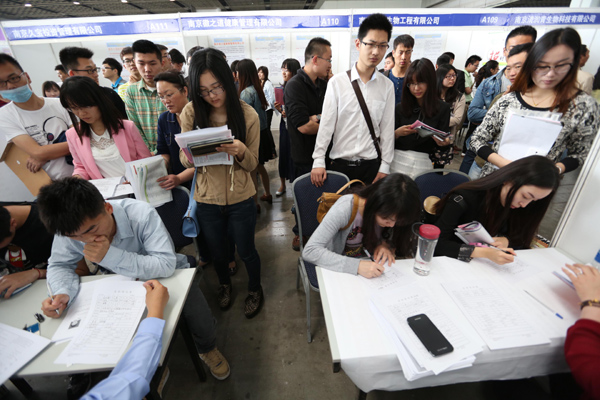 |
|
More than 40,000 graduates attend a job fair held in May in Nanjing, Jiangsu province. QI TA/CHINA DAILY |
Shen Yu recently resigned from the kindergarten where she worked for two months, waving goodbye to her first job after graduating from university last year and knowing she would suffer setbacks looking for a job again.
"The 3,000 yuan ($471) monthly salary didn't pay me back for my years of study, and I didn't get a sense of belonging from the job," said the 23-year-old Shanghai native, who has a bachelor's degree in financial management.
Shen is among the roughly 8 percent-or 600,000-of last year's college graduates who have failed to find a job. Apart from some who opted to study abroad, the rest were postponing a job, according to the 2015 annual report on Chinese college graduates' employment released by MyCOS, an education data and consulting company. The data was collected in the second half of last year.
"Seen from the perspective of the current job-hunting season, the proportion of those who decided to delay the working world may be a little higher," said Zhou Haiwang, deputy director of the Institute of Urban and Population Development Studies at the Shanghai Academy of Social Sciences, adding that the number of this group has been increasing in recent years.
According to an online poll conducted by Jiefang Daily, more than 70 percent of respondents have relatives or friends who postpone work after graduation, taking time to look for ideal jobs or mulling entrepreneurial plans. A total of 1,000 Shanghai residents participated in the poll.
Unemployed young people nowadays have higher education qualifications and longer periods of unemployment, according to Ying Hongqing, deputy director of the Shanghai Municipal Human Resources and Social Security Bureau.
Nearly 60 percent of respondents in the survey said the principal reason they put off starting work is having not found the right job. Shen is in this situation. She denied that she began working later in a bid to dodge the increasingly fierce competition to secure a place amid today's tough job market.
The number of college graduates has continued to climb for the past 15 years, and reached a record 7.49 million this year. This year's job-hunting season saw 220,000 more graduates than the previous year, but slowing economic growth means diminished recruitment by companies.
Although unemployed again, Shen said she did not feel there was any need to rush. "Looking for the right career is like looking for Mr. Right. Maybe I could have found a job or two, but I don't want to just make a living or be stuck in a specific position," she said.
Most people believe that favorable economic conditions in more households is an important factor allowing the young generation more time to find desirable jobs.
"In the past, even if people did not feel satisfied with their jobs, they looked for another one while working," said Hu Shuwen, a 39-year-old white-collar worker in a multinational company.
"Moreover, some parents' attitude of surrendering money to invest in children's education has changed. They don't expect that the investment must be paid back by a decent job. They hope children have a better life experience," she said.
Some of those who delay work are considering starting their own business.
Gao Shuyong, who graduated two years ago with a major in finance from a renowned university in Shanghai, recently decided to participate in the thriving e-commerce scene by launching an online store selling custom-made women's dresses.
She contacted a classmate in senior high school who was also unemployed and the two connected with the idea of starting the store.
"My former classmate has a good relationship with several clothes producers, and cloth and fabric manufacturers. I have some marketing knowledge and have my understanding of fashion. We can combine our strengths," Gao said.
Social experts said the phenomenon of some young people delaying work is, to some extent, a reflection of the progress of society.
"Society is showing a higher degree of acceptance toward young people's diverse development routes," Zhou Haiwang said.
